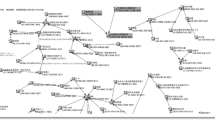Abstract
In this paper we present a method that combines the cognitive and socio-cultural paradigms for automatically identifying the most important moments (the so-called pivotal moments) from a Computer Supported Collaborative Learning chat. The existing applications do not identify these moments and we propose a flexible visual method for filling this gap. Since these moments may have different roles in a discourse, we also propose a classification of the identified types of important moments from chat conversations.
Access this chapter
Tax calculation will be finalised at checkout
Purchases are for personal use only
Preview
Unable to display preview. Download preview PDF.
Similar content being viewed by others
References
Bakhtin, M.M.: Problems of Dostoevsky’s Poetics, Ardis (1973)
Jurafsky, D., Martin, J.H.: Speech and Language Processing: An Introduction to NLP, Computational Linguistics and Speech Recognition, 2nd edn. Prentice-Hall (2009)
Koschmann, T.: Toward a Dialogic Theory of Learning: Bakhtin’s Contribution to Learning in Settings of Collaboration. In: Proceedings of the CSCL 1999 Conf., pp. 308–313 (1999)
Morris, J., Hirst, G.: Lexical Cohesion, the Thesaurus, and the Structure of Text. Computational Linguistics 17(1), 211–232 (1991)
Rebedea, T., Dascălu, M., Trausan-Matu, S., Banica, D., Gartner, A., Chiru, C., Mihaila, D.: Overview and Preliminary Results of Using PolyCAFe for Collaboration Analysis and Feedback Generation. In: Proceedings of ECTEL 2010, pp. 420–425. Springer (2010)
Sfard, A.: On reform movement and the limits of mathematical discourse. Mathematical Thinking and Learning 2(3), 157–189 (2000)
Trausan-Matu, S.: The Polyphonic Model of Hybrid and Collaborative Learning. In: Wang, Fong, Kwan (eds.) Handbook of Research on Hybrid Learning Models: Advanced Tools, Technologies, and Applications, pp. 466–486. Information Sc. Publishing, Hershey (2010)
Trausan-Matu, S., Rebedea, T.: A Polyphonic Model and System for Inter-animation Analysis in Chat Conversations with Multiple Participants. In: Gelbukh, A. (ed.) CICLing 2010. LNCS, vol. 6008, pp. 354–363. Springer, Heidelberg (2010)
Vygotsky, L.: Mind in society. Harvard University Press, Cambridge (1978)
Author information
Authors and Affiliations
Editor information
Editors and Affiliations
Rights and permissions
Copyright information
© 2012 Springer-Verlag Berlin Heidelberg
About this paper
Cite this paper
Chiru, CG., Trausan-Matu, S. (2012). Identification and Classification of the Most Important Moments from Students’ Collaborative Discourses. In: Cerri, S.A., Clancey, W.J., Papadourakis, G., Panourgia, K. (eds) Intelligent Tutoring Systems. ITS 2012. Lecture Notes in Computer Science, vol 7315. Springer, Berlin, Heidelberg. https://doi.org/10.1007/978-3-642-30950-2_43
Download citation
DOI: https://doi.org/10.1007/978-3-642-30950-2_43
Publisher Name: Springer, Berlin, Heidelberg
Print ISBN: 978-3-642-30949-6
Online ISBN: 978-3-642-30950-2
eBook Packages: Computer ScienceComputer Science (R0)




